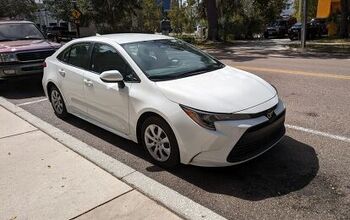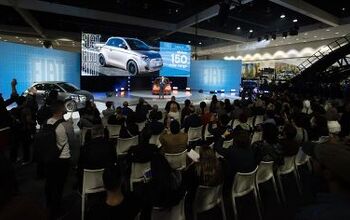Chevy Cancels US-Market Plans For Orlando Compact MPV
Chevrolet has had a difficult time deciding if its Cruze-based MPV, known as the Orlando, is a good fit for the US-market. Initially, Chevy debuted the Orlando concept at the Paris auto show, and said it had no plans for a US-market version. Then it was approved for the US ahead of the 2009 Detroit Auto Show, and now, according to Automotive News [sub], it’s off again. The (up to) seven-passenger MPV, built on GM’s “Delta II” compact architecture will be sold in Europe, Asia, and even Canada… just not in the US. Chevy spokesfolks explain:
The best thing to do for Chevrolet is to focus on the brands we’ve already brought to market: the Traverse, Equinox, Malibu and, soon to come, the Cruze. We feel that with those vehicles, Chevrolet has plenty of options for the modern family.
Of course, Chevy sells all three of those vehicles in Canada as well… so how are these three options “plenty” for US consumers, but not for our friendly neighbors to the North?
And then there’s one more crucial consideration: with a Volt MPV5 being shown at the Beijing Auto Show, there’s a good chance the five-seat plug-in is coming to the US. And because the MPV5 looks so much like an Orlando with a Volt grille slapped on, GM’s planners might have thought that the MPV5 would be more successful in the US as a plug-in -only model. And maybe they’re right. Still, the Orlando is one of the more compelling (if awfully named) vehicles to be teased by GM of late… we can’t say we’re thrilled to see the US-version canceled.
More by Edward Niedermeyer
Latest Car Reviews
Read moreLatest Product Reviews
Read moreRecent Comments
- Kjhkjlhkjhkljh kljhjkhjklhkjh A prelude is a bad idea. There is already Acura with all the weird sport trims. This will not make back it's R&D money.
- Analoggrotto I don't see a red car here, how blazing stupid are you people?
- Redapple2 Love the wheels
- Redapple2 Good luck to them. They used to make great cars. 510. 240Z, Sentra SE-R. Maxima. Frontier.
- Joe65688619 Under Ghosn they went through the same short-term bottom-line thinking that GM did in the 80s/90s, and they have not recovered say, to their heyday in the 50s and 60s in terms of market share and innovation. Poor design decisions (a CVT in their front-wheel drive "4-Door Sports Car", model overlap in a poorly performing segment (they never needed the Altima AND the Maxima...what they needed was one vehicle with different drivetrain, including hybrid, to compete with the Accord/Camry, and decontenting their vehicles: My 2012 QX56 (I know, not a Nissan, but the same holds for the Armada) had power rear windows in the cargo area that could vent, a glass hatch on the back door that could be opened separate from the whole liftgate (in such a tall vehicle, kinda essential if you have it in a garage and want to load the trunk without having to open the garage door to make room for the lift gate), a nice driver's side folding armrest, and a few other quality-of-life details absent from my 2018 QX80. In a competitive market this attention to detai is can be the differentiator that sell cars. Now they are caught in the middle of the market, competing more with Hyundai and Kia and selling discounted vehicles near the same price points, but losing money on them. They invested also invested a lot in niche platforms. The Leaf was one of the first full EVs, but never really evolved. They misjudged the market - luxury EVs are selling, small budget models not so much. Variable compression engines offering little in terms of real-world power or tech, let a lot of complexity that is leading to higher failure rates. Aside from the Z and GT-R (low volume models), not much forced induction (whether your a fan or not, look at what Honda did with the CR-V and Acura RDX - same chassis, slap a turbo on it, make it nicer inside, and now you can sell it as a semi-premium brand with higher markup). That said, I do believe they retain the technical and engineering capability to do far better. About time management realized they need to make smarter investments and understand their markets better.


































Comments
Join the conversation
If it had the stickshift and the sliding doors, it could compete with the Mazda5. They don't sell well, but if gas prices spike, then people will trade their Siennas, Odysseys, and Grand Caravans (and possibly their Highlanders, Pilots, and Lambdas) for something like this.
GM still doesn't want to sell small cars. They don't ever make them money, and they are always crap anyway. The Japanese and Hyundai have that market cornered. I dont think I'd want anything designed by Gm Korea (Daewoo) anyway.